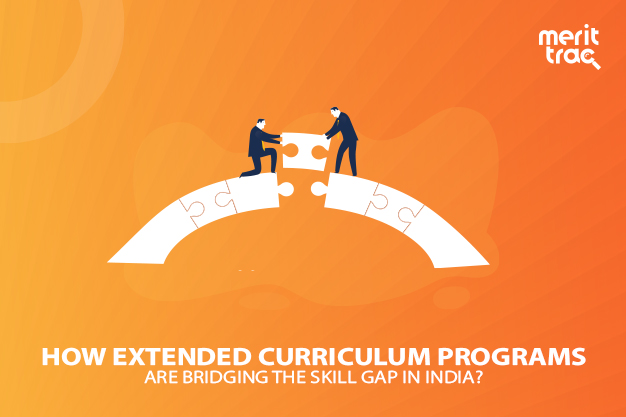
How Extended Curriculum Programs are Bridging the Skill Gap in India?
Date: 08/07/2020 | Posted by: Ajmal V | Category: Employability , Employability Skills , Education
The modern workplace emphasizes more on skills these days rather than just the qualifications of their employees. Hence, the skills get much more weightage during the fresher hiring process. Although millions of students graduate every year, the organizations are facing an acute shortage of skilled talent around the world. The industry across sectors need very specific soft and hard skills for the fresh passouts to perform from day one.
In India, the situation is more concerning. As per Centre for Monitoring Indian Economy (CMIE) the unemployment rate in June 2020 stood at 10.99 per cent, better than that of previous months – May (23.48%) and April (23.52%) – but still higher than pre-lockdown months. It is estimated that there will be 104.62 million fresh entrants in the labour market by 2022; in fact, India will need to create 8.1 million jobs annually, against the 5.5 million created in 2017, to keep employment rates constant between 2015 and 2025.[i]
Widening skill gap
According to a LinkedIn Research report[ii], 82% ofIndian professionals feel that the skills needed to succeed are changing rapidly. Among them, 62% of professionals feel daunted by the pace of change. Also, a NASSCOM report[iii] in February this year outlined that lack of digital capabilities and skills to be a key hiring risk, while most of the organizations are trying to capitalize on digitalization. The digitally skilled professionals in India across all emerging technologies is estimated to reach 8,84,000 in FY2020.
The list of most demanded skills for 2020 as collated by the LinkedIn[iv] show a fluctuation from its previous report. While four out of five soft skills remained unchanged – only emotional intelligence found a place in the list – blockchain, affiliated marketing and scientific secured a spot among the top ten hard skills.
Based on the communications with various professional trainers, the online portal People Matters pointed out four skill gaps[v] – health and safety, digitization, virtual communication and leadership, and writing and speaking – surfaced with the COVID-19 outbreak, besides the demand for talents in emerging technologies like AI-ML, data science, cloud computing and analytics skills.
The skill gap forces the organizations to spend money and time to train the newly inducted employees in order to set the standard skills necessary to perform in a particular role. In this way, the skill gap is unsettling the employment scenario as well as the economy.
Extended Curriculum Programs (ECP) to bridge the gap
Another issue is the sharp difference between demand and supply for specific skills. The supply for talent to fill the specific roles is lesser than the demand, though the institutions are producing the talents with generic abilities. The onus on matching generic to specifics on the demand side by training the freshly hired talent to meet the specificities of the roles. Only when the supply side, i.e, the institutions, takes the responsibility, the gap will be filled.
MeritTrac, India’s leading assessment and testing company, brings the Extended Curriculum Programs (ECP). With an extensive support to the institutions, ECP aims to diminish the skill gap and build industry-ready graduates upon completing the college/university education. The Program supplements the current curriculum with industry approved courses.
The end-to-end holistic approach includes contextual content crafted by subject matter experts (SMEs) and validated by industry leaders; expert-led session with the options to study online anywhere anytime; periodic assessments; certifications or credit points with detailed analytical insights from either Manipal Global or Jigsaw Academy; industry connection through expert interactions and live case studies; and career assistance by preparing the students to become ready to face corporates.
The specialized courses are in big data analytics, data science, artificial intelligence, cloud computing, business analytics, and modern sales. While some courses are focusing on engineering and management students, others are for students from various streams.
Benefits of ECP
An interested student undergoes three stages to complete the program. In the first stage, a comprehensive assessment is undertaken to identify the existing expertise and gap. The second stage is learning, wherein the student acquires new skills with interactive sessions and hands-on projects and assignments. During the final stage, a post-course assessment is done to test if the student is industry-ready and certify accordingly.
Both students and institutions are benefitted from the Program. The program has been designed to supplement the existing curriculum. Moreover, the students get a real value-add to their CVs, hands-on project experience to showcase, add-on certification across tech & business skills, besides industry interface and alumni status for life-long learning. At the same time, institutions can scale up their corporate pull, better placement, alumni base and accreditation, and the higher average salary of outgoing students.
Moreover, the program is bundled with career guidance to the students to crack the hiring process with CV building sessions, soft skill workshops, mock interviews, and networking sessions with corporates. Students are given question banks to prepare for recruitment assessments and interviews and students’ CVs will be distributed among placement agencies and hiring partners.
In sum, the Extended Curriculum Programs help the colleges and universities to produce job-ready talent from their institutions. A tie-up with MeritTrac will transform the institutions to be champions of New India by filling the skill gap in the country’s job market.
[i]https://www.forbes.com/sites/prakashmallya/2018/05/06/india-is-creating-millions-of-high-skilled-jobs-but-its-education-system-isnt-keeping-up/#5bc421a0480f
[ii]https://www.bloombergquint.com/business/62-pc-indian-professionals-feel-daunted-by-rapid-pace-of-changing-skills-linkedin
[iii]https://community.nasscom.in/communities/nasscom-insights/future-skilling-for-the-digital-economy.html
[iv]https://learning.linkedin.com/blog/learning-thought-leadership/most-in-demand-skills-2020#:~:text=Topping%20this%20year's%20list%20are,are%20notably%20absent%20this%20year.
[v]https://www.peoplematters.in/article/skilling/covid-19-has-surfaced-these-skill-gaps-now-we-need-to-fill-them-26010
Handpicked Articles for Futher Reading
Relevant Case Studies/Whitepapers:













 Sales Hotline: USA: +1 646 916 0939 / Others: +91 80619 14700
Sales Hotline: USA: +1 646 916 0939 / Others: +91 80619 14700


